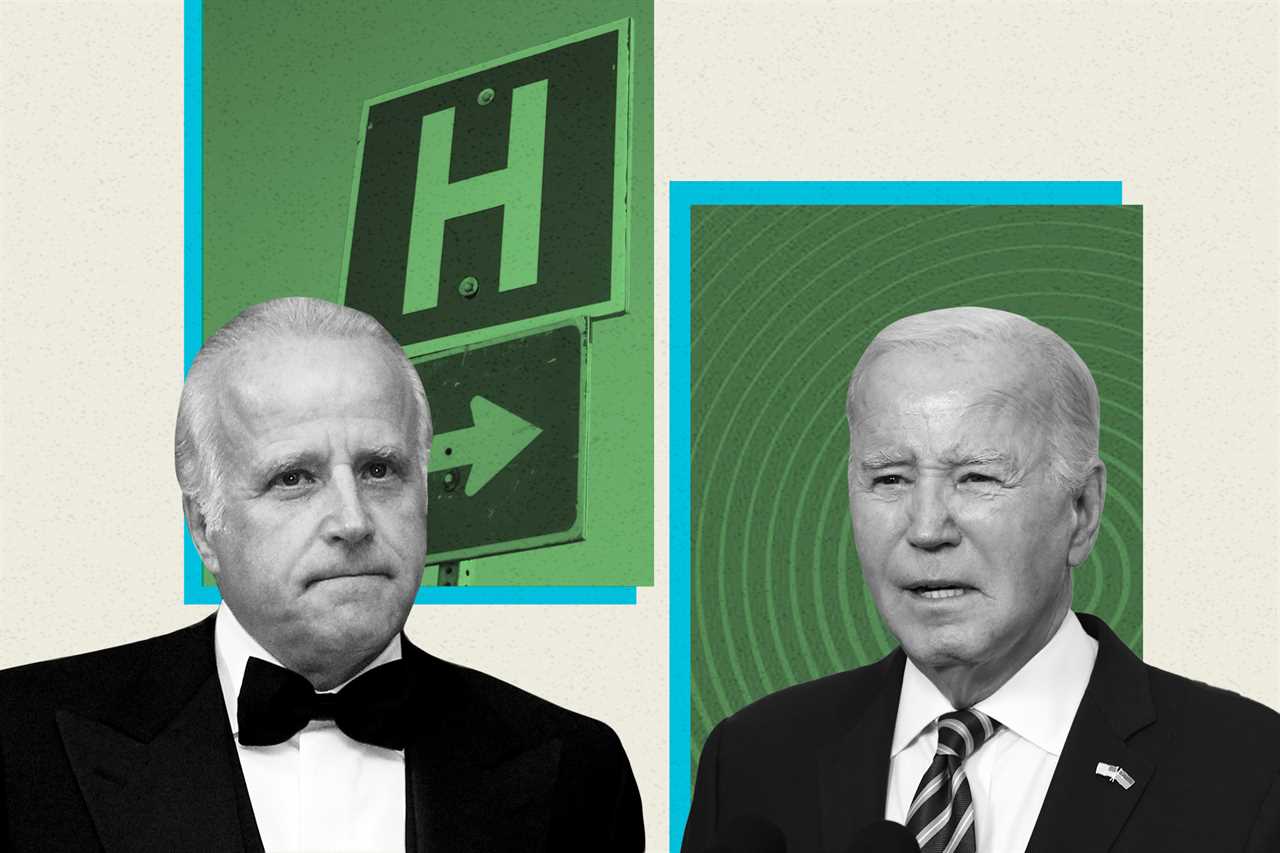
In 2017, a hospital operator set out to build a rural health care empire with the help of a Philadelphia-area consultant.
The consultant, Jim Biden, had no experience running hospitals. But he did understand the federal government and had ties to labor unions. Perhaps more important, he was the younger brother of Joe Biden.
The final years of the Obama administration had cemented the former vice president’s towering stature in the world of health care, where he had made the fight against cancer a top federal priority and, then, a centerpiece of his legacy-building efforts.
For then 67-year-old Jim Biden, the third of four Biden siblings, his ties to his older brother made up much of his pitch as he pursued deals that could help Americore make money from drug rehab, lab testing and even cancer treatment.
“This would be a perfect platform to expose my Brothers team to [your] protocol,” Jim Biden wrote to the CEO of a Tampa-area company that controlled licensing rights to an experimental cancer treatment the hospital operator wanted to offer. “Could provide a great opportunity for some real exposure.”
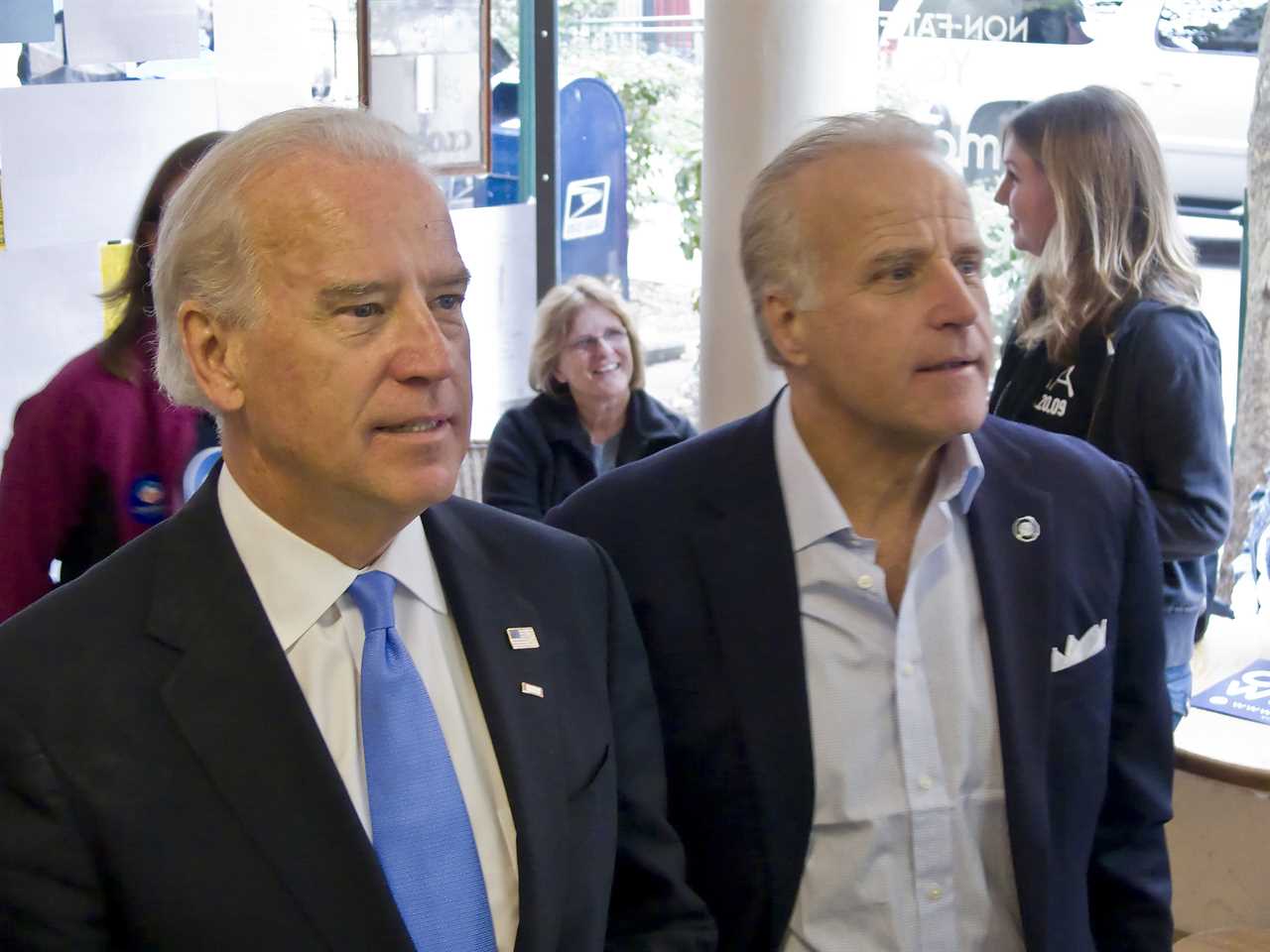
The email, obtained by POLITICO from a person close to the company, documents one of the many ways in which Jim Biden invoked his brother’s name and clout in the course of his work with Americore, which has since gone bankrupt, wreaking havoc in rural communities in the process.
Jim Biden spoke of plans to give his brother equity in Americore, according to one former Americore executive, and install him on its board, according to a second. He also said that if Americore could find a winning business model for rural health care, his brother could promote the company in a future presidential campaign, a third former executive told POLITICO. All were granted anonymity to discuss a company mired in legal and political controversy
In order to fund Americore’s expansion, Jim Biden offered to secure capital from investors in the Middle East, according to the emails and executives. When the expected money did not arrive, it aggravated Americore’s preexisting financial issues. The company collapsed, leaving behind unpaid bills and neglected patients.
The management failures took a human toll as hospital staff went unpaid, services dwindled, and authorities were forced to intervene. At Americore’s hospital in southeastern Kentucky — ravaged by staff departures and dwindling medical supplies — a patient died of cardiac arrest in late 2018 after receiving substandard care, according to a Department of Health and Human Services report obtained by POLITICO.
Four years after its bankruptcy, federal investigators are still pursuing questions about what else happened at Americore.
In September, the Securities and Exchange Commission accused one of Jim Biden’s business partners of fraud related to loans to the company, allegations the business partner has denied.
Meanwhile, the Justice Department found that Americore’s hospital in Pennsylvania entered into sham service agreements and paid kickbacks as part of a scheme that billed the government for medically unnecessary lab tests the hospital shipped out to be performed elsewhere.
Those actions are at the center of a federal prosecution of a $100 million conspiracy to defraud Medicare that has netted a guilty plea from the recipient of the kickbacks, and, according to a person familiar with the case, remains ongoing.
Now, House Republicans pursuing an impeachment inquiry focused on the relationship between the president and his relatives’ business dealings have also homed in on Americore. The House Oversight Committee is set to interview Jim Biden on Feb. 21 as part of the inquiry.
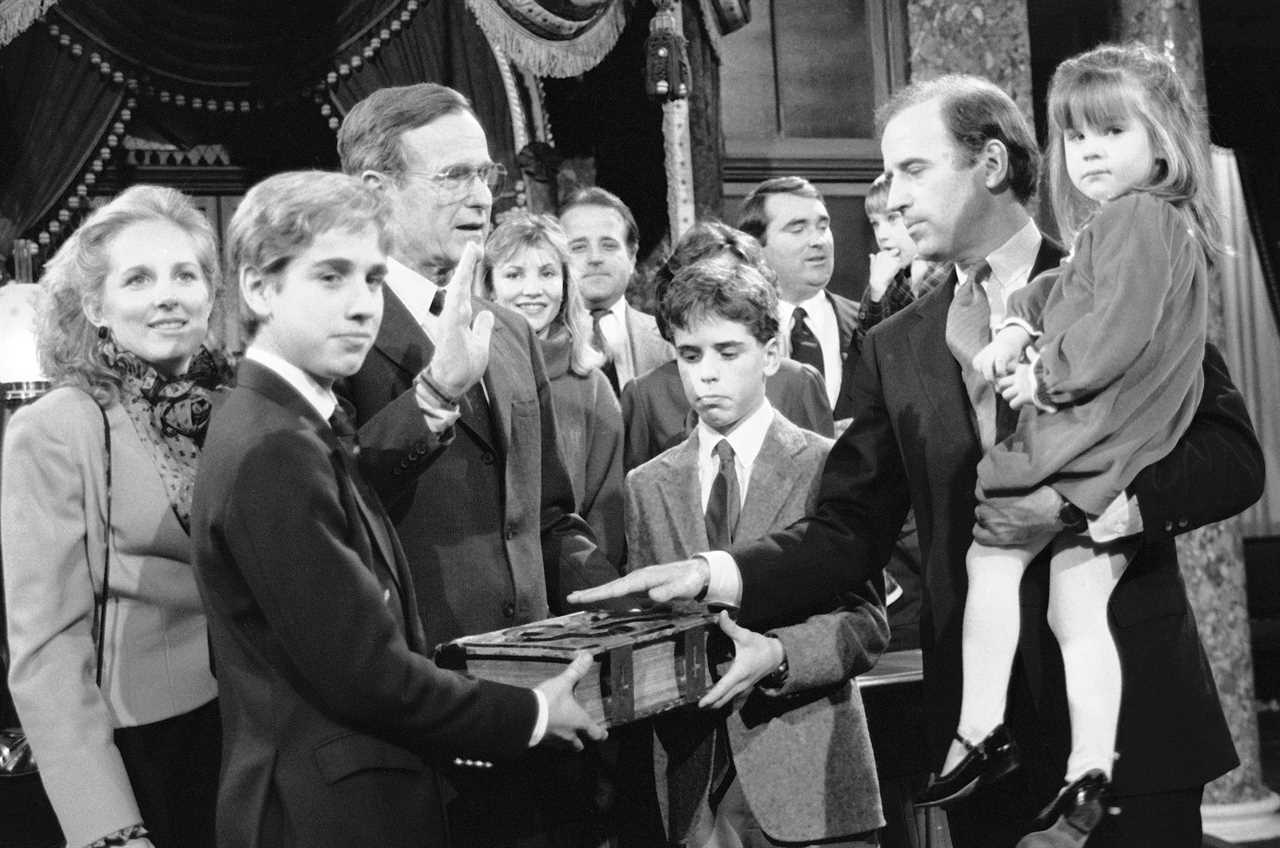
As the layers of activity that occurred in and around Americore are peeled back in a federal prosecution in Pennsylvania, a bankruptcy court in Kentucky, and tense witness interviews on Capitol Hill, a POLITICO investigation renders the most detailed picture to date of the ways in which Joe Biden’s relatives leveraged his public stature to advance a private business venture.
The investigation — based on public records, court filings, dozens of interviews and hundreds of exclusively obtained internal documents — reveals that Jim Biden’s role at Americore was larger than previously reported: In some internal documents and investor materials his name is included among its top handful of leaders. He also helped the company seal regulatory approval to acquire the Pennsylvania hospital and personally fired Americore’s chief financial officer, according to the emails obtained by POLITICO.
The investigation also reveals that Joe Biden’s name and inner circle were more involved with the company than has been understood: In addition to the accounts provided by former executives, investor materials described Jim Biden as an adviser to his older brother. And on top of Joe Biden’s own previously reported encounter with the firm’s CEO, at least three of Joe Biden’s relatives did work with Americore. They include Jim Biden’s wife, Sara, and his son, Jamie. The president’s son, Hunter Biden also met with its CEO, and his personal doctor — current White House physician Kevin O’Connor — joined a meeting with Jim Biden and the president of a hospital being acquired by Americore, according to a former executive and emails obtained by POLITICO.
While the extent to which Joe Biden’s relatives have invoked their ties to him to advance their business careers has been a subject of ongoing controversy, the documents obtained by POLITICO demonstrate that Joe Biden was a central element of Jim Biden’s pitch to potential partners and investors during this period.
None of these Biden family members would answer specific questions related to Ameriore. The White House did not respond to detailed requests for comment.
Jim Biden has not been accused of criminal wrongdoing. His attorney, Paul Fishman, said in a statement that he “conducted himself ethically and honorably in all his business dealings.” A spokesman for Jim Biden declined to answer detailed follow-up questions, writing, “We are not able to participate in this story at this time.”
POLITICO’s investigation did not find that Joe Biden involved himself in the firm or took actions on its behalf. However, Joe Biden did benefit indirectly from his brother’s work with the firm. On the same day Jim Biden received a $200,000 payment from Americore, he made out a check for his brother Joe. The White House has said the check was for repayment of a loan, but did not respond to questions about the circumstances of the loan, including whether Joe Biden was aware of his brother’s income from Americore.
Otherwise, Joe Biden remained on the sidelines as his name and relatives became intertwined with a company that was pitched as a vehicle for his legacy, but stands accused of defrauding taxpayers instead.
“I was sold that Americore was going to be the salvation of rural hospitals,” said one of the former executives. “The whole thing was a scam, and it didn't take that long to figure it out.”
Mississippi Roots
Jim Biden’s involvement with Americore traces back to his family’s decades-long ties to a circle of Mississippi attorneys that supported Joe Biden’s national political ambitions when he served in the Senate.
Since serving as finance chairman of his brother’s first Senate campaign in his early 20s, Jim Biden had regularly struck up business relationships with Joe Biden’s political backers, including the Mississippians.
The circle orbited around tort lawyer Dickie Scruggs, a brother-in-law of former Republican Senate Majority Leader Trent Lott, who achieved fame and fortune in the 1990s through his scorched-earth legal fights against big tobacco companies.
One of Scruggs’ associates had worked for Joe Biden’s 1988 presidential campaign, and when Scruggs needed congressional support for a large tobacco settlement, he hired Jim Biden as a consultant.
Then, in 2007, Scruggs became an early supporter of Joe Biden’s Democratic presidential primary bid, but the high-flying tort lawyer’s star soon came crashing down when he was caught trying to bribe a judge in a dispute over attorney’s fees.
Scruggs’ downfall also dealt a blow to Jim Biden: As his big brother wielded the gavel of the Senate Foreign Relations Committee and pursued his second presidential run, he was preparing to launch an international lobbying firm with two Scruggs associates. When both of the men were implicated in the bribery scheme and convicted along with Scruggs, the lobbying business was abandoned.
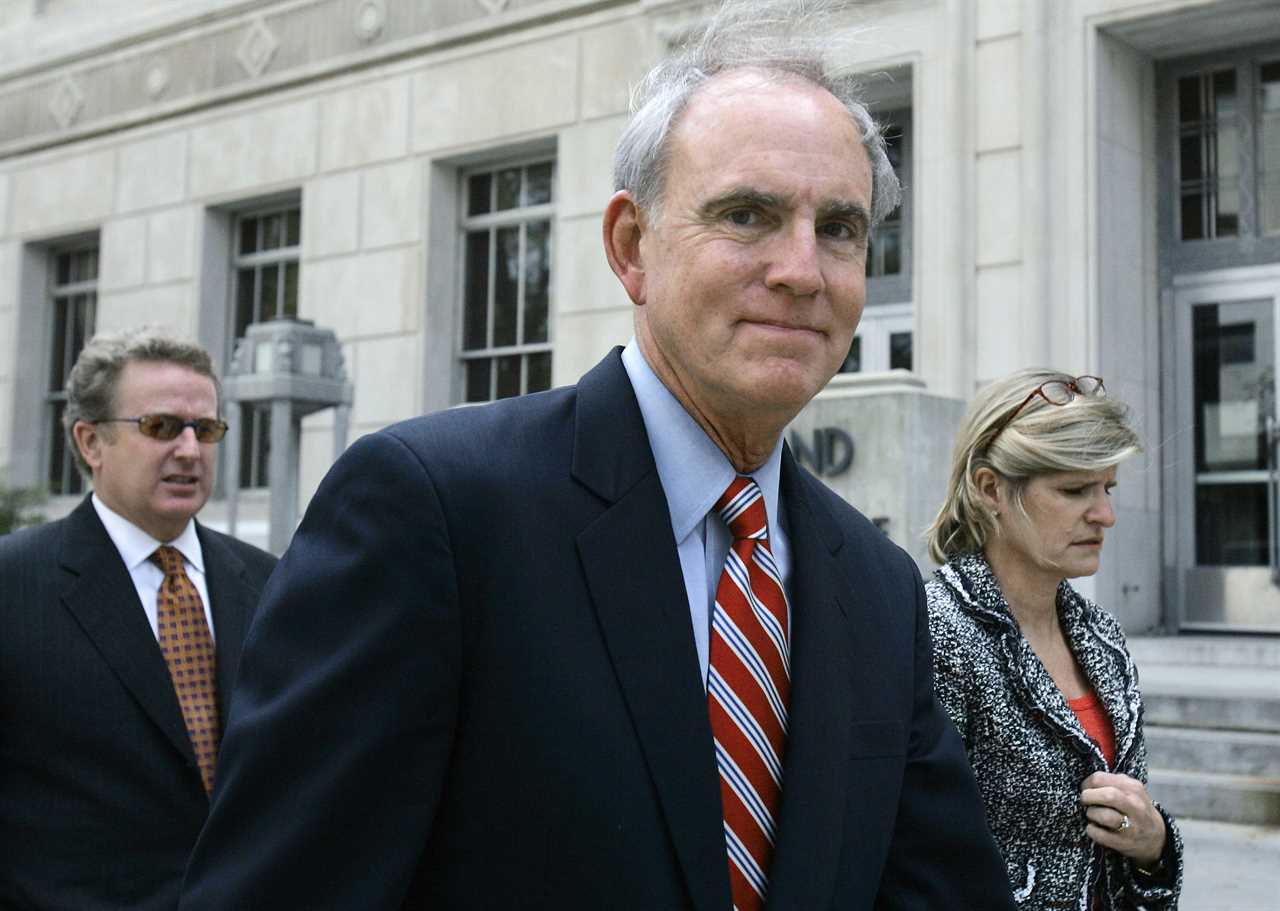
Jim Biden’s dealings went much further with Joey Langston, another lawyer convicted for trying to bribe a judge for Scruggs. When Langston got out of prison, he went into the health care field, and Jim Biden joined him.
Like the Bidens, Langston’s family is a close-knit clan. Just as Jim Biden regularly involved his nephew Hunter in his ventures, Joey Langston sometimes did business with his son, Keaton Langston. A former business partner of the Langstons recalled being struck in a business meeting when Keaton Langston referred to his father as “daddy.”
Some details of the Jim Biden-Joey Langston relationship have emerged from the impeachment inquiry in recent months.
According to a person familiar with Joey Langston’s congressional interview earlier this month, he told investigators that he has lent Jim Biden $800,000, that he has received only $400,000 in repayment, and that he has no documentation of the loans.
According to a second person familiar with the interview transcript, Joey Langston said he has not spoken to Joe Biden in more than a decade and did not know of Joe Biden having any involvement in his brother’s dealings.
Many details of the relationship between Jim Biden and Joey Langston remain sketchy. Sometime around 2015, the two men became involved in a business called Trina Health, in which Jim Biden at one point described himself as a partner.
Trina championed a controversial method for treating diabetes that some insurers balked at paying for. Trina’s founder, G. Ford Gilbert, lobbied the state’s legislature to force insurers to pay for his product. But he was caught bribing the majority leader of Alabama’s House of Representatives, Republican Micky Hammon, leading to Gilbert’s conviction.
Jim Biden and Joey Langston, who were not implicated in the scheme, moved on from Trina, but maintained an interest in the business of health care.
The Biden Brand
In early 2017, Joe Biden was in legacy-building mode.
His son Beau Biden’s battle with brain cancer had inspired the Cancer Moonshot, a federal push to cure the disease, and closely linked the Biden name with health care in the public imagination.
In the waning days of the Obama administration, the outgoing vice president announced he would continue the cancer fight with a nonprofit, the Biden Cancer Initiative. In June, the nonprofit officially launched.
At the time, Jim Biden was in empire-building mode. Like his older brother, his plans included health care.
One aspect involved a business that allowed hospitals to outsource the complicated, but often lucrative, work of performing medical tests to a specialized service.
In May 2017, a company that provided lab services, Fountain Health, LLC, was incorporated in Mississippi with Keaton Langston listed as its sole member. And it was through Fountain Health that Jim Biden first found his way to Americore, according to one of the hospital operator’s former executives.
At the time, Americore had recently been founded by a Canadian entrepreneur, Grant White, as a vehicle for taking over distressed rural hospitals. White believed he could create a better business model for these facilities by capitalizing on the value of their underlying real estate, and the company was in the process of acquiring a handful of hospitals across the eastern half of the United States.
One of them was in Pineville, the seat of Bell County in southeastern Kentucky. That’s where both Langstons and Jim Biden showed up in May 2017 to pitch Americore on outsourcing its lab services, according to the former Americore executive.
White, who had little experience running clinical labs himself, was sold on the idea.
By early June, Fountain had made a deal with a hospital that Americore had recently agreed to acquire outside of Pittsburgh, according to a contract obtained by POLITICO.
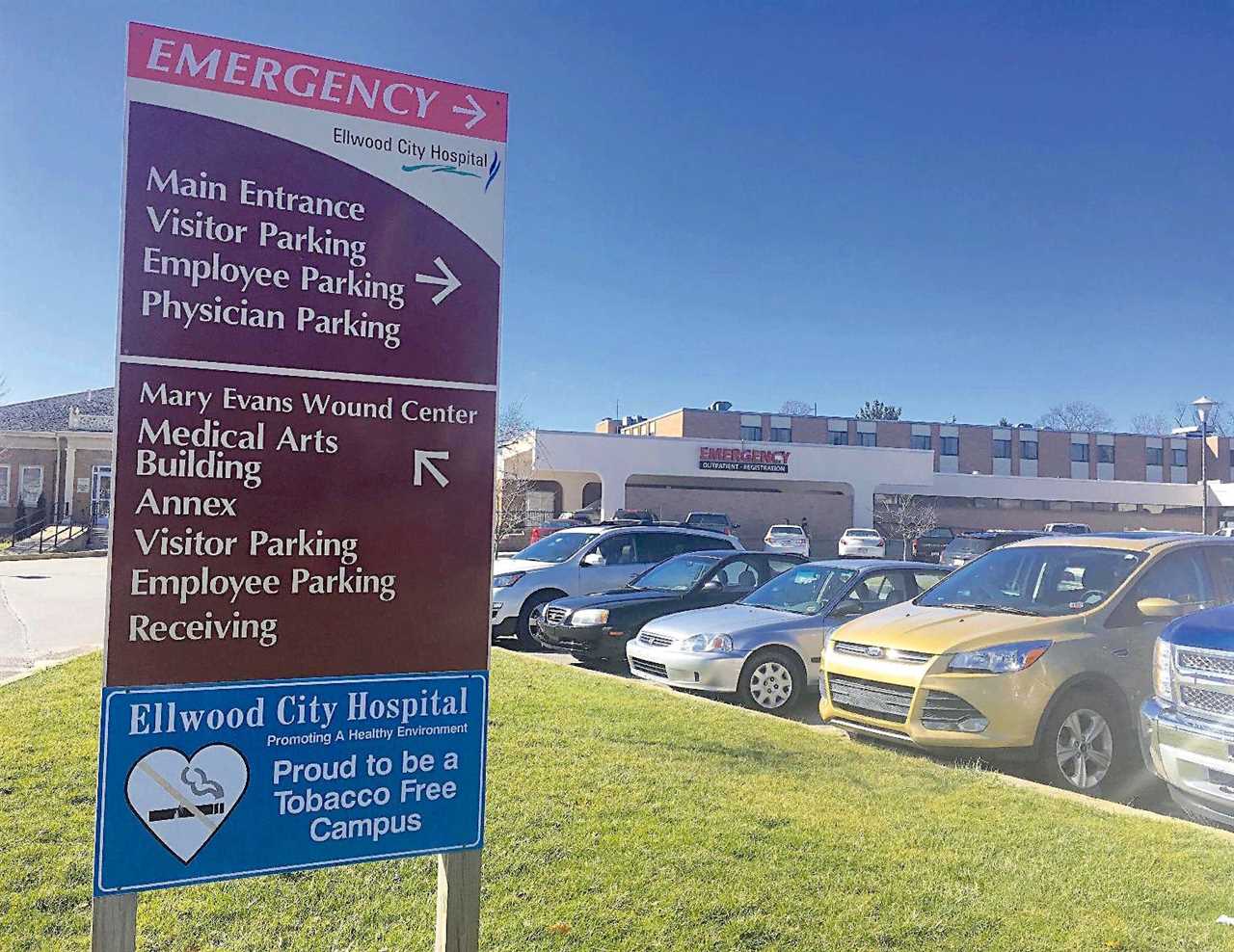
The contract was included in a cache of tens of thousands of internal Americore documents, dealing with all aspects of the business, which changed hands in the course of one of the many private disputes related to the company. POLITICO, which first began reporting on Jim Biden’s Americore involvement in 2019, recently obtained the cache, and this article draws on hundreds of the documents within it.
Jim Biden’s representatives declined to respond to questions about whether he has a relationship with Fountain Health.
As relations deepened between Fountain Health and Americore in the summer of 2017, Jim Biden grew closer to White. He saw even more potential in struggling rural hospitals than the value contained in their real estate.
In addition to cancer treatment, he believed he could help Americore land contracts from the Veterans Affairs Department, an area rife with federal subsidies, and from labor groups, political allies of his older brother with whom he had built longstanding business ties over the decades, according to emails and the former Americore executives.
A few weeks after Fountain concluded the deal with Ellwood City Hospital in Pennsylvania, Jim Biden took O’Connor, an army veteran who served as Joe Biden’s government-provided doctor during the Obama administration, to meet with the hospital’s president, Beverly Annarumo.
“You and your team clearly share our vision, and I look forward to seeing you again in coming months,” O’Connor, who now serves as Biden’s White House physician, wrote to Annarumo later that week. Annarumo did not respond to requests for comment.
The White House did not respond to requests to interview O’Connor. The physician, who also lists an affiliation with the George Washington University’s medical school, did not respond to an email sent to him through the university’s website.
As the summer wore on, plans for a health care empire continued apace.
On July 12, Joey Langston emailed Jim Biden, Keaton Langston, White and two others to schedule a “meeting for Fountain Health partners” the next week.
“Jim will report to the group the results of his discussions earlier today with a contact at [Blue Cross Blue Shield],” he wrote. “There will also be discussion about how to proceed with the Union contacts that have been made by Jim and Keaton, within the last two weeks.”
The partners’ meeting had to be put off so that White and Jim Biden could attend a meeting in Ellwood City, where Americore’s hospital acquisition faced review by the state.
Once the acquisition was completed, Joey Langston wrote in another email to Jim Biden and others, Fountain could dramatically increase the samples it sent to Ellwood City for lab testing.
But before the deal could close, it needed to be reviewed by the office of Pennsylvania’s attorney general. At the time, that was Josh Shapiro, who, as the Democratic nominee for that post in 2016, had campaigned alongside Joe Biden.
Approval was no guarantee. Americore’s efforts to acquire a hospital in southwest Virginia were encountering resistance: Local authorities had learned about financial problems in Pineville, where the hospital had just failed to make payroll, and about one of White’s previous ventures in Canada, in which investors had been saddled with losses.
In Pennsylvania, the company had a leg up. With his roots in Scranton, and his three decades representing neighboring Delaware, Joe Biden had earned the honorific of Pennsylvania’s “third senator,” and an endorsement from a Biden could help ease concerns about Americore’s trustworthiness.
On a Thursday afternoon in July, Shapiro’s office held a hearing at the hospital to solicit feedback on the proposed takeover. In a show of support, Jim Biden accompanied White, who noted the presence of his new ally. “We also have Jim Biden here as one of our strategic partners,” White said, according to a transcript of the hearing obtained under Pennsylvania’s Right-to-Know Law. “Very familiar person I’m sure.”
In the weeks that followed, Shapiro recommended the approval of Americore’s acquisition of the hospital, which began going by the name Ellwood City Medical Center, according to a September 2017 order issued by Lawrence County judge David Acker that greenlit the takeover.
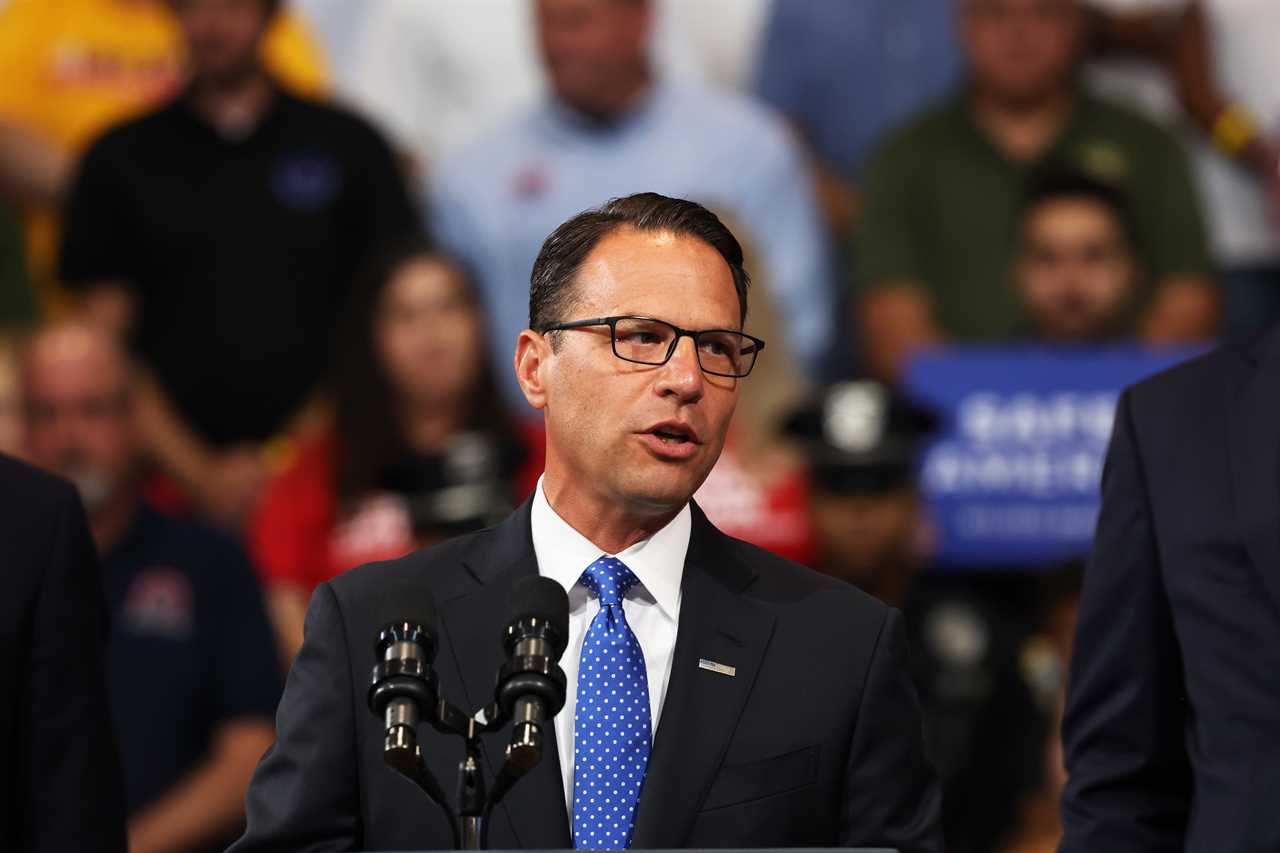
Representatives for the attorney general’s office directed requests for more information about the approval to the state’s public records process, where a request for documents remains pending. Representatives for Shapiro, who now serves as governor, did not respond to requests for comment.
Americore’s bid enjoyed support from some local stakeholders, and it is unclear what role Jim Biden’s help played in the approval.
His appearance at the Ellwood City hearing had been a rare sign of visible support. As a personal business bio he sent Grant White a few days after the hearing made clear, he preferred to operate in the background.
“Jim has been advising his brother in relation to implementing the Cancer Moonshot, his nephew Beau Biden’s legacy foundation and other Biden family projects,” the bio states. “Through the years, Jim has personally met and has maintained relationships with many key governmental and business leaders throughout the world. He remains the closest personal advisor to his brother. He prides himself in maintaining a low business and political profile.”
Big Brother
In private, Jim Biden was less shy, especially when it came to invoking his older brother.
Several former Americore executives said Joe Biden was central to Jim Biden’s ambitions for the company.
One said that Jim Biden explained to him "His brother was very interested in rural health care and very interested in veterans’ health care and it was something he really wanted to get behind."
In fact, Jim Biden told the executive, if Americore successfully demonstrated a model for revitalizing rural health care, Joe Biden could run on it in 2020. "This would help his brother get elected if it were to take off and go," the former executive explained.
Another former executive said that Jim Biden spoke of plans — which did not come to pass — to give Joe Biden equity in Americore.
The plans were part of broader discussions about Jim Biden taking an equity stake of his own in the company, this person said.
A third former executive said that White and Jim Biden spoke of plans to put Joe Biden on Americore’s board.
None of them recalled any indication that Joe Biden ever did involve himself in the company, though his younger brother also invoked him in the course of wooing potential business partners and acquisition targets outside of Americore.
One person on the receiving end of Jim Biden’s health care pitch recalled a phone call in which Jim Biden said he was sitting in a car next to his brother Joe. Joe Biden has said that he never discussed business with his brother.
Previously, an executive who was suing Jim Biden told POLITICO that in a call with the maker of an oral health care rinse he had offered to have the product promoted by the Biden Cancer Initiative. At the time, a spokesman for Jim Biden dismissed that allegation as “pure fantasy.”
The newly obtained email sent to another potential business partner confirms that Joe Biden at times was featured in Jim Biden’s pitch. “This would be a perfect platform to expose my Brothers team to [your] protocol,” he wrote to Jonathan Brenner, the CEO of Tampa-area health care firm Medicus. Brenner did not respond to requests for comment.
While Joe Biden has said he never discussed business with Jim Biden, he did have a chance to meet Americore’s CEO.
In September of 2017, White attended a fundraiser for the Beau Biden Foundation, a nonprofit dedicated to fighting child abuse, alongside Jim Biden. At the event at the Wilmington Country Club, White met Joe Biden, though there is no indication they discussed business.
The next month, White met Jim and Hunter Biden for lunch at the Mandarin Oriental Hotel in Manhattan. The trio discussed the possibility that Americore could land an investment from associates of Jim and Hunter Biden affiliated with CEFC, a Chinese energy firm, according to a person familiar with the conversation.
Tracy Schmaler, a communications consultant who has been fielding media inquiries on behalf of Hunter Biden’s legal team, did not respond to a request for information about the encounter.
In November, Jim and Hunter’s plans with the Chinese businessmen were upended when one of them, Patrick Ho, was arrested by the FBI for bribing government officials in Chad and Uganda.
As he looked elsewhere for investment capital, Jim Biden enlisted the help of more relatives.
Emails also show that his son, Jamie Biden — a creative type known for his turn as a long-haired DJ in the Hamptons — pitched in, helping to create a video presentation about Americore intended to entice investors.
Jim Biden’s wife, Sara Biden, an attorney and a partner in Jim’s consulting firm, Lion Hall Group, was more involved. She helped prepare investor presentations and for a time was given her own Americore email address, according to emails obtained by POLITICO.
Neither Jamie Biden nor Sara Biden responded to requests for comment.
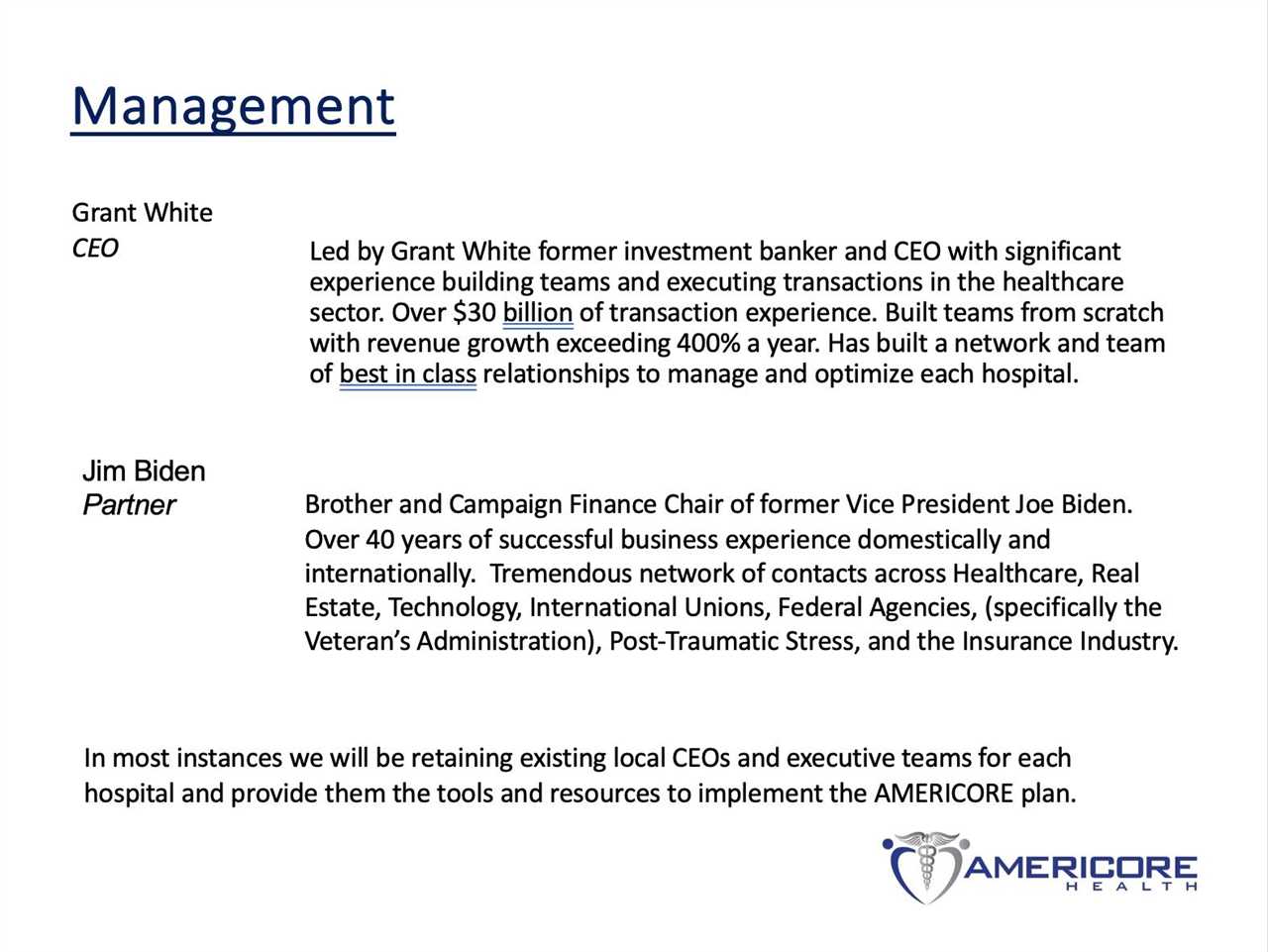
At one point, Sara Biden sent a person involved with fundraising a draft investor presentation “with a few minor revisions by Jim.” The presentation describes Jim Biden as a partner with Americore alongside a brief bio that begins by identifying him as “Brother and Campaign Finance Chair of former Vice President Joe Biden.”
‘Threatening the former vice president’
As the hunt for financing continued, Jim Biden increasingly focused on deep-pocketed investors from the Middle East. He said his connections there would help him land Americore a large investment, according to former Americore executive Tom Pritchard, who spoke to POLITICO about the matter in 2020, as well as three other former executives at the company.
For help, he worked with a hedge fund manager, Michael Lewitt, with whom he was friendly, and Amer Rustom, the CEO of business development firm the Platinum Group, who has boasted of ties to officials in the Middle East. Eventually, Lewitt and a group of Platinum-related companies committed to raise the $30 million for Americore, according to a complaint filed against Lewitt by the SEC.
Rustom did not respond to requests for comments sent to the Platinum Group.
In August of 2017, Jim Biden began workshopping a letter that Rustom was to deliver to Khaled Sultan Al Rabban, an official at the Qatar Investment Authority, according to emails obtained by POLITICO. He shared one version of the letter with White. A few days later, Sara Biden sent an updated version to Hunter Biden to review.
In this draft, which was among the documents found on Hunter Biden’s abandoned laptop, Jim Biden writes that, though the Bidens are not lobbyists, “My family could provide a wealth of introductions and business opportunities at the highest levels that I believe would be worthy of the interest of His Excellency.”
“On behalf of the Biden family, I welcome your interest here,” the letter states. Jim Biden’s representatives declined to respond to questions about his efforts to raise overseas capital, and the Qatar Investment Authority did not respond to a request for comment.
Whatever happened with the Qataris, months went by without an investment arriving. By January 2018, Americore was insolvent, according to the SEC’s complaint against Lewitt.
In the middle of that month, Lewitt’s fund extended Americore a lifeline in the form of a bridge loan, meant to hold it over until the real investment capital arrived. The size of the initial loan was $2 million, according to the SEC’s complaint.
A few days later, Americore wired Jim Biden $400,000. Bank records filed in Americore’s federal bankruptcy case describe the payment as a loan.
Around this time, Jim Biden — who has been variously described in internal documents and investor presentations as an Americore “partner,” “principal” and “advisor” — waded deeper into the business. He set up an office at Americore’s Fort Lauderdale headquarters and began participating in some hiring and firing decisions, interviews with former executives and emails show.
On March 1, Americore wired Jim Biden $200,000, again described in bank records as a loan. That same day, Jim Biden wrote a check to Joe Biden for $200,000, describing it as a loan repayment in the memo line.
The White House, which did not respond to questions about the transfer, has also characterized it as a loan repayment in statements to media outlets. POLITICO previously reviewed bank records that show a $200,000 payment to Jim Biden from an account that appeared to belong to Joe Biden made several weeks earlier.
With Lewitt’s bridge funding keeping Americore afloat, the company continued to pursue a big overseas investment.
On Friday, March 9, Americore executives worked into the night to prepare materials for their investor pitch.
But according to a person present, those efforts hit a hitch when the company’s new financial officer, Tony Sudduth, refused to put together financial statements. Sudduth protested, the person said, that he had not been provided with enough information, such as bank records documenting the firm’s debts and revenues, to produce legitimate statements.
The next morning, a Saturday, Jim Biden summoned Sudduth to the office and fired him, according to emails and a person familiar with the situation. The firing set off a flurry of emails between Jim Biden, Americore executives and the company’s outside counsel.
In a memo drafted to memorialize the firing, Jim Biden wrote that White directed him to fire Sudduth. According to the memo, Jim Biden informed the ousted CFO that “The synergies weren’t right, and that for a myriad of reasons, some of which I may not even be fully aware, it was determined that it was necessary to terminate him.”
Two weeks later, Sudduth emailed Jim Biden and White to demand severance. “I have seen enough,” he wrote, “that I am pretty sure Americore’s partners would not welcome a public battle that will ultimately disclose and expose the complete workings of the organization.”
The email does not specify what Sudduth might expose, but a person familiar with the situation said that Sudduth had concluded during the course of his short tenure that the company’s business model was premised on overcharging for lab tests.
In a note to outside counsel, White remarked that Sudduth’s email, in which he alludes to the prominence of the Biden family, “reads like he is threatening the former vice president of the United States.”
Despite the company’s tight finances, Americore later drafted a severance agreement that offered Sudduth, who had worked there for about two months, $100,000.
Jim Biden’s representatives declined to respond to a question about Sudduth’s firing and Sudduth declined to comment.
At the time, the company still expected that a large cash infusion was imminent.
In late March, Jim Biden confirmed in an email to White that Americore would have a $30 million line of credit in place by mid-April to begin financing acquisitions.
But the money still did not materialize.
By mid-May, bickering began to ensue. White threatened to get financing elsewhere. Jim Biden responded with a soul-baring note, expressing hurt that White had undermined him in front of others.
“Believe it or not, I am a sensitive person where optics makes a big difference in my life,” he wrote.
He implored White to provide a more detailed financial picture of the operation, writing, “This kind of investment would generate a great deal of scrutiny both of the company’s financials and of me personally.” And he emphasized his own commitment to raising money for the company, writing, “I agreed to go to Qatar, Saudi Arabia and China (at my own expense).”
He also took exception to the suggestion that White did not need him. “I believe in my value” he wrote, “with the VA, Labor, the Blues, drug & rehab, the financial community, etc.”
A ‘blockage’ in Dubai
The strain reflected the company’s dire need for money as it awaited financing. The problem was made worse by pressure on its lab billing revenues.
Back in January 2018, the head of the Ellwood City Medical Center had emailed Americore executives, as well as the Langstons, with bad news: Blue Cross was suspending payments for lab services and refusing to pay for tests submitted by Ellwood’s lab that came from out-of-state patients.
The hospital in Pineville also faced financial problems. There, Americore had, without warning, stopped paying health insurance premiums for its Pineville employees. Staffers, who continued to have the premiums deducted from their paychecks, only learned of the problem when their insurance claims met with surprise rejections.
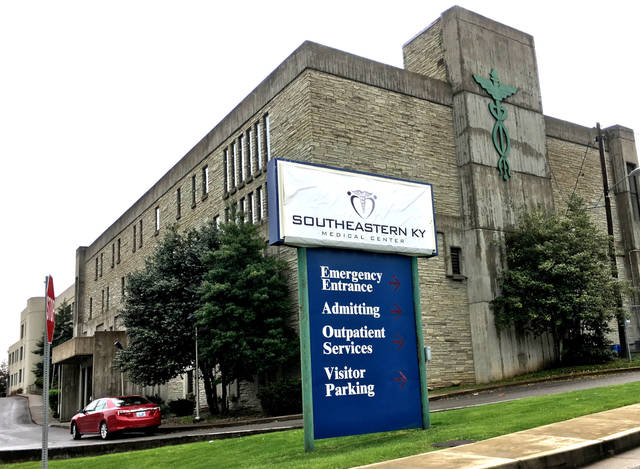
As a result, when the husband of one longtime employee, Betsy Marsee, died, her life insurance claim was denied, according to Pineville Mayor Scott Madon, a former executive at the hospital, and a report in the Middlesboro News. Attempts to reach Marsee were unsuccessful.
In April of that year, the Kentucky labor department opened a criminal investigation into the unpaid premiums. The department did not respond to a request for comment.
As the financial strain grew, White increasingly came to rely on merchant cash advances — which in effect often amounted to high-interest loans — to keep his operation afloat.
In June, one of Americore’s lenders, GTR Source, obtained a $1.5 million judgment against it, one of several obtained by Americore’s creditors in New York. As a result, PNC Bank froze Ellwood City Hospital’s bank accounts, sparking panic inside the company and a protracted legal fight.
For a time, it appeared that financial relief was in sight as Lewitt tried to transfer funds between the United Arab Emirates and its neighbor, Qatar, in order to move them into the United States.
In late June, Lewitt wrote to Jim Biden and White, “We are working on moving the Dubai money into Qatar. The blockage is slowing things down but we are moving as quickly as we can… Amer would like me to join Jim for the presentation to the Finance Minister in Doha so as soon as we have the date I will plan my travel.”
Asked about the nature of the blockage, Lewitt declined to comment. Whatever issue was preventing Americore from accessing the overseas funds, it was not resolved in time to save the company.
Around this time, Jim Biden and Grant White were pursuing a more extensive partnership that would have given Jim Biden’s Lion Hall Group a roughly one-third stake in an Americore holding company that would own several subsidiaries, according to emails, documents and a proposed operating agreement, dated June 18, 2018, obtained by POLITICO.
Instead, on July 5, Jim Biden suddenly cut off contact with White altogether. “Based on information I have become aware of over the last several days, it has become increasingly clear to me that moving forward I can’t be involved with Americore,” he wrote.
Pritchard previously told POLITICO the departure was related to politics: “Jim needed to lay low because his brother was possibly running for president, and he didn’t need any bad press.”
That summer, Lewitt wrote in an email that emerged in later litigation that relations with White had soured because White had failed to disclose he had taken out merchant cash advances and generally managed the company’s finances poorly.
White declined to comment “for the time being.”
Despite the falling out with White, Jim Biden’s foray into health care was not over. He, Lewitt and Rustom continued to separately court two companies that had previously been in partnership talks with Americore.
Later, those companies sued Jim Biden, Lewitt, Rustom and others in federal court in Tennessee, alleging in filings that they engaged in a “classic fraudulent bait-and-switch.”
According to the Tennessee complaint, Jim Biden and his associates encouraged the two companies to make costly acquisitions while promising to fund them with an imminent overseas investment that never materialized. The complaint alleged that the intent of those actions was to drive the companies into bankruptcy so that Jim Biden and his associates could then take control of the companies.
Jim Biden and his associates denied wrongdoing in the Tennessee case, which settled on undisclosed terms.
‘Liquid gold’
While Jim Biden had cut off direct contact with Americore, the same was not true for all of his associates.
Lewitt’s fund lent the company additional funds, and Keaton Langston continued to provide lab testing services through Fountain Health.
But in the months after Jim Biden parted ways with White, Americore’s finances deteriorated, and scrutiny of its lab billing practices intensified.
In September, United Healthcare sent its hospital in Ellwood City an audit letter, obtained by POLITICO, saying that it was investigating a dramatic surge in billing claims for lab services that began in the third quarter of 2017.
A spokesman for the insurer, Bryan Fisher, declined to share the results of its investigation, citing the sensitivity of billing audits and the frequency with which their results attract attention from law enforcement.
Indeed, lab billing schemes have kept federal law enforcement officials busy in recent years, as loosely connected criminal networks swap tips about the most lucrative tests and the latest loopholes that people seeking to defraud Medicare can exploit to thwart detection.
Many of the schemes involve teams of marketers who fan out to well-trafficked locations like senior centers and health fairs and induce people, often the elderly, to provide cheek swabs on the promise of receiving a free disease screening. Another popular avenue for lab billing frauds in recent years has been drug testing, which can be so lucrative that some in the drug rehab have world taken to calling urine “liquid gold.”
At Americore’s hospital in Ellwood City, the alleged fraud had begun with drug tests, which were performed elsewhere and then billed to private insurers, according to a complaint filed in federal bankruptcy court in Kentucky against Keaton Langston and others by Carol Fox, the DOJ-appointed trustee charged with overseeing Americore’s liquidation.
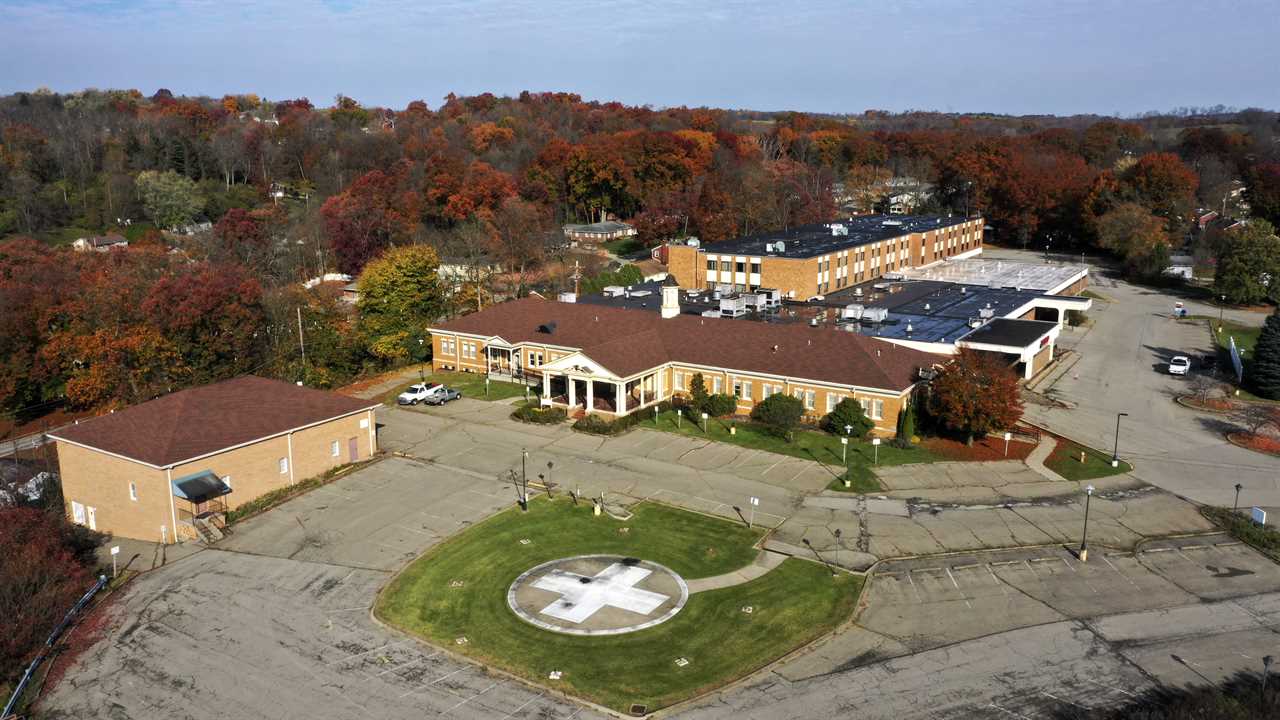
(The complaint also names a Fountain Health entity in Delaware as a defendant, saying that Keaton Langston and a co-conspirator, Florida businessman Daniel Hurt, who has admitted to his role in Medicare fraud at the hospital, owned or controlled it. Other than a shared connection to Keaton Langston, it is not clear if that Fountain Health entity is related to the one Keaton Langston registered in Mississippi.)
When the insurance companies discovered the alleged fraud and started to claw back their money, Keaton Langston and his co-conspirators allegedly embarked on a Medicare fraud scheme, according to the complaint.
The alleged conspirators targeted senior citizens at sites around the country that included churches and synagogues, inducing them to provide cheek swabs for genetic cancer tests that were then shipped to Ellwood City, according to Fox’s complaint, which states they were then repackaged for processing elsewhere, while Americore’s hospital filed millions of dollars worth of fraudulent Medicare claims for tests it did not perform.
Keaton Langston’s Fountain Health email address is no longer working. A phone number listed for him on one of Fountain Health’s contracts was disconnected. The contract also lists an email address for Keaton Langston at the Mississippi law firm of Langston & Lott, but a note sent to that address did not receive a response.
Casey Langston Lott, a cousin of Keaton Langston’s and the owner of that law firm, said Keaton Langston is not affiliated with his firm. He declined to provide contact information for Keaton Langston.
Lott is listed as the registered agent of the Fountain Health entity that Keaton Langston incorporated in Mississippi, but he told POLITICO that he was not familiar with Fountain Health.
In September, court records show, the bankruptcy court approved a settlement in which Keaton Langston denied wrongdoing and agreed to pay $240,000.
Lott, who acted as his uncle Joey Langston’s lawyer for his impeachment inquiry interview, said that his uncle declined to comment for this article.
‘Endangering the lives of my patients’
Even as tens of millions of dollars flowed into Ellwood City Medical Center from Medicare fraud, the quality of care at the hospital diminished.
In the final months of 2018, as Americore stopped paying bills, doctors abandoned the hospital and utility providers prepared to cut it off from gas and water.
Employee paychecks were delayed, and then started to dry up altogether. Alan Dambach, who served on the local board of trustees overseeing the hospital, said that when stray funds came into the hospital through accounts receivable, they were quickly divvied up among staff who had stopped receiving regular paychecks. Sporadic, meager pay was better than none at all.
The Lawrence County District Attorney opened a criminal investigation of the hospital. So did Shapiro’s office and the U.S. Department of Labor.
In January of 2019, Pennsylvania’s Health Department placed the hospital on a probationary license, citing failures that included the need to transfer a surgery patient because it had run out of supplies, according to an investigation of the hospital’s shortcomings published by the local Beaver County Times. Eventually, the health department shuttered Ellwood City’s inpatient services and emergency room altogether.
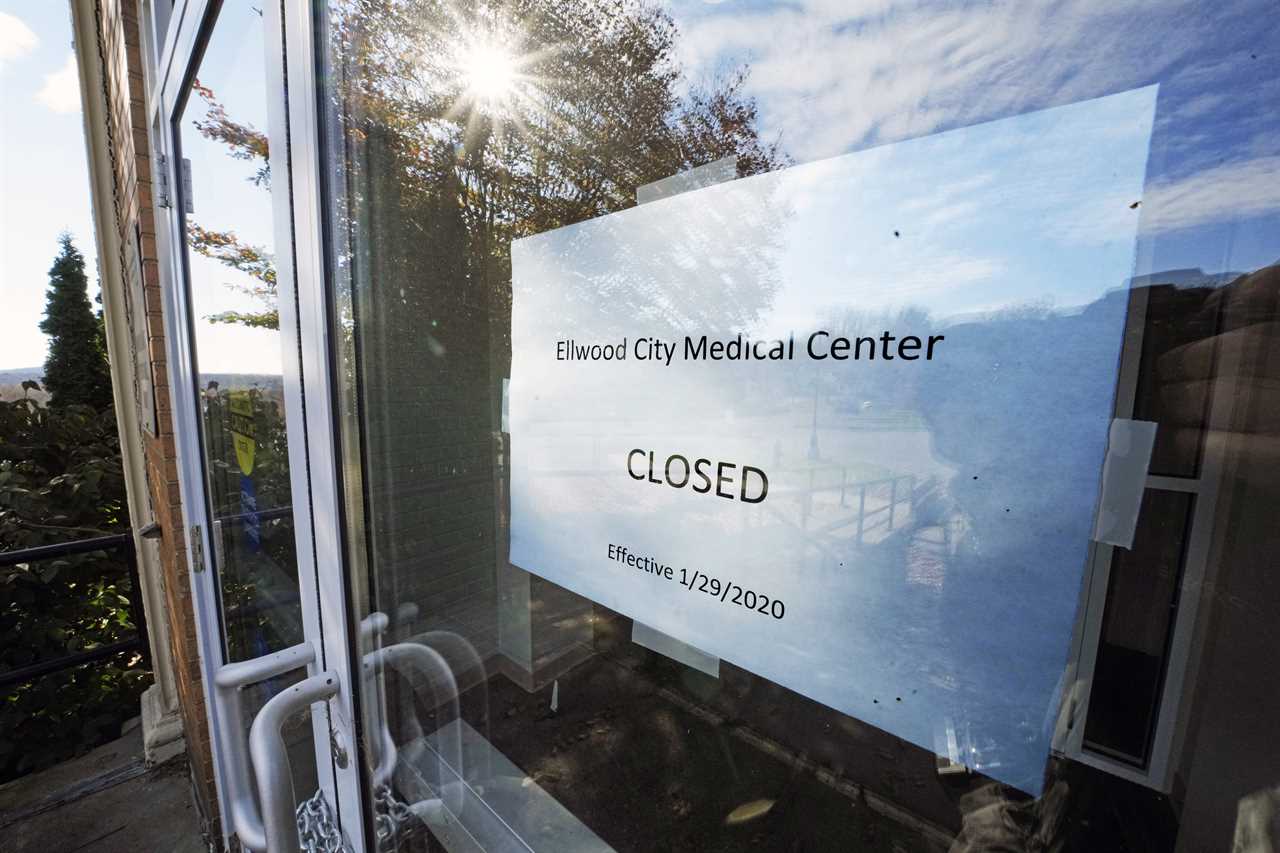
At Americore’s hospital in Pineville, Kentucky, the situation was arguably worse.
A January 2019 report by HHS’ Centers for Medicare & Medicaid Services — obtained by POLITICO from Kentucky’s health department — paints a vivid picture of conditions there.
Over the course of 2018, doctors left, equipment went without maintenance and medical supplies became scarce. At times, staffers had to leave the operating room mid-surgery to track down missing gauze.
In July of 2018, a nurse in the hospital’s emergency department told an emergency dispatcher not to bother bringing in a stroke victim. “We are just going to kill this guy,” the nurse explained, according to an audio recording cited in the report. The patient, already en route to Pineville, was diverted via helicopter to another hospital.
In October, the report said, a surgeon quit after concluding that operating there was “endangering the lives of my patients.”
Then, just after 8 p.m. on the first Tuesday of December, a patient arrived in the throes of cardiac arrest.
Twice, the patient needed epinephrine to stimulate their heart, but the hospital did not have enough of the drug on hand, and staff from the ambulance service had to provide it.
A doctor ordered an X-ray of the patient’s chest, but it appears none was taken: A nurse later told an HHS investigator that there were no radiology staffers on hand that night.
At 9:55, the patient, identified by HHS only as Patient #12, was pronounced dead.
A few months later, the city was forced to take over the hospital and fire much of its staff.
Though Jim Biden was long gone, some people involved with the company felt he should share some blame for the fiasco.
“My impression is that the fact that the money Biden promised didn’t come, it had a ripple effect,” recalled one executive at the Pineville hospital, who was granted anonymity to discuss internal matters. “Things didn't get paid.”
On New Year’s Eve, Americore filed for bankruptcy.
Congress, the Courts and a Conviction
Americore’s collapse created legal and political shockwaves that continue to reverberate four years later.
Three weeks before the bankruptcy filing, FBI agents paid Pineville a visit, according to a person interviewed by them there. Among the topics they asked about was lab billing, he said.
The next month, the FBI raided the Ellwood City Medical Center.
In 2022, the Justice Department obtained a guilty plea from Daniel Hurt — the Florida businessman named in Fox’s civil complaint — for his role in the Medicare fraud scheme run through the hospital and a third Fountain Health entity. A lawyer for Hurt, Colin Callahan, declined to comment.
Prosecutors alleged that, in some cases, the hospital fraudulently billed Medicare more than $6,000 for tests that were ordered on the basis of phony prescriptions and that it paid Hurt kickbacks from its Medicare reimbursements under the guise of sham service agreements.
The Justice Department filing accompanying Hurt’s guilty plea states that he worked with co-conspirators, but does not name them.
A person familiar with the Justice Department’s criminal case said it remains open.
Also in 2022, Fox, the bankruptcy trustee, sued Jim Biden for fraudulent transfer over the payments he received from Americore, saying he had failed to repay loans from the company.
Jim Biden responded that the transfers had in fact been consulting payments. The dispute settled, with Fox stipulating she had not been provided evidence that Jim Biden engaged in fraud and Jim Biden agreeing to pay back $350,000 of the $610,000 he had received from Americore.
This past September, the SEC sued Lewitt alleging he had defrauded his fund’s clients, including a large number of senior citizens. The agency alleged that his loans to Americore violated the fund’s policies and that Lewitt had taken $4.7 million out of the fund for his own personal use. Lewitt has denied wrongdoing.
With Americore in ruins, taxpayers have little prospect of being made whole. The federal government has filed a claim for more than $142 million from the defunct company for Medicare fraud alone, according to bankruptcy court filings.
House Republicans — who have already interviewed Fox — have signaled their intention to further probe Americore and people tied to it.
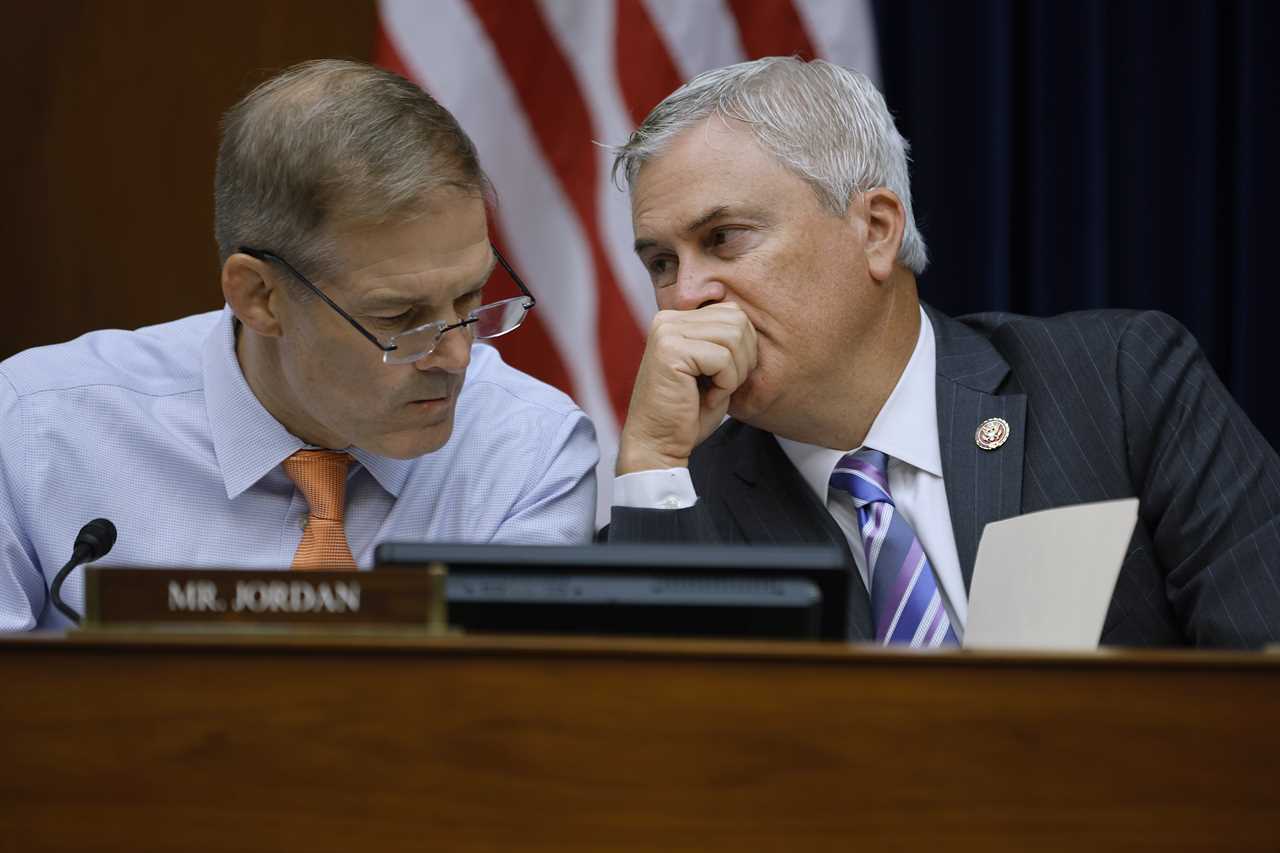
In December, Oversight Chair James Comer (R-Ky.) and Judiciary Chair Jim Jordan (R-Ohio) sent Lewitt a letter seeking his testimony.
“I will of course tell them everything I know. I’m surprised it took them so long to contact me,” Lewitt told POLITICO. “Stay tuned.”
As Washington investigates the Americore saga, the rural communities where it operated are still trying to make sense of it themselves.
In Pineville, the hospital’s operations have stabilized with the financial help of a local bank.
The city’s mayor, Madon, said that residents still have questions about Americore’s tenure. His elderly mother, who worked as a telephone operator at the hospital there, has complained, he said, that she fielded confusing phone calls from drug test recipients all over the country who were themselves confused by their billing records: “Ma’am, where is Pineville, Kentucky? I’m from so-and-so Texas.”
Madon said that members of the hospital’s board had initially taken comfort in the appearance of a Biden at the troubled hospital. “They were elated,” he recalled. “Here’s the savior.”
Instead, things only got worse.
Now, Madon is just relieved that Americore’s turn in his city has ended, he said. “It beats anything I’ve ever seen.”
----------------------------------------
By: Ben Schreckinger
Title: The Biden name: How the president’s brother became embroiled in a hospital fiasco
Sourced From: www.politico.com/news/2024/02/18/the-biden-name-how-the-presidents-brother-became-embroiled-in-a-hospital-fiasco-00141868
Published Date: Sun, 18 Feb 2024 07:00:00 EST






